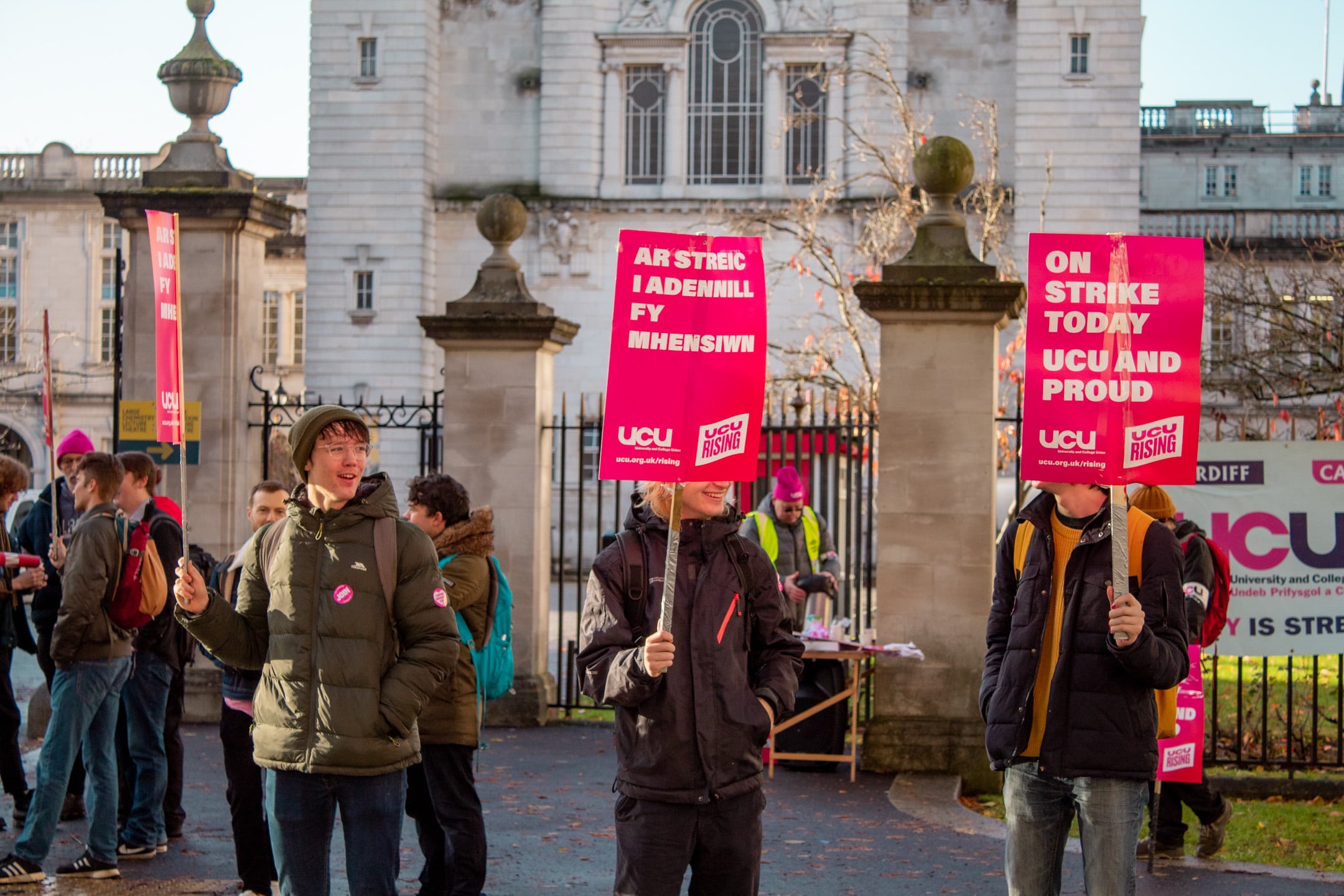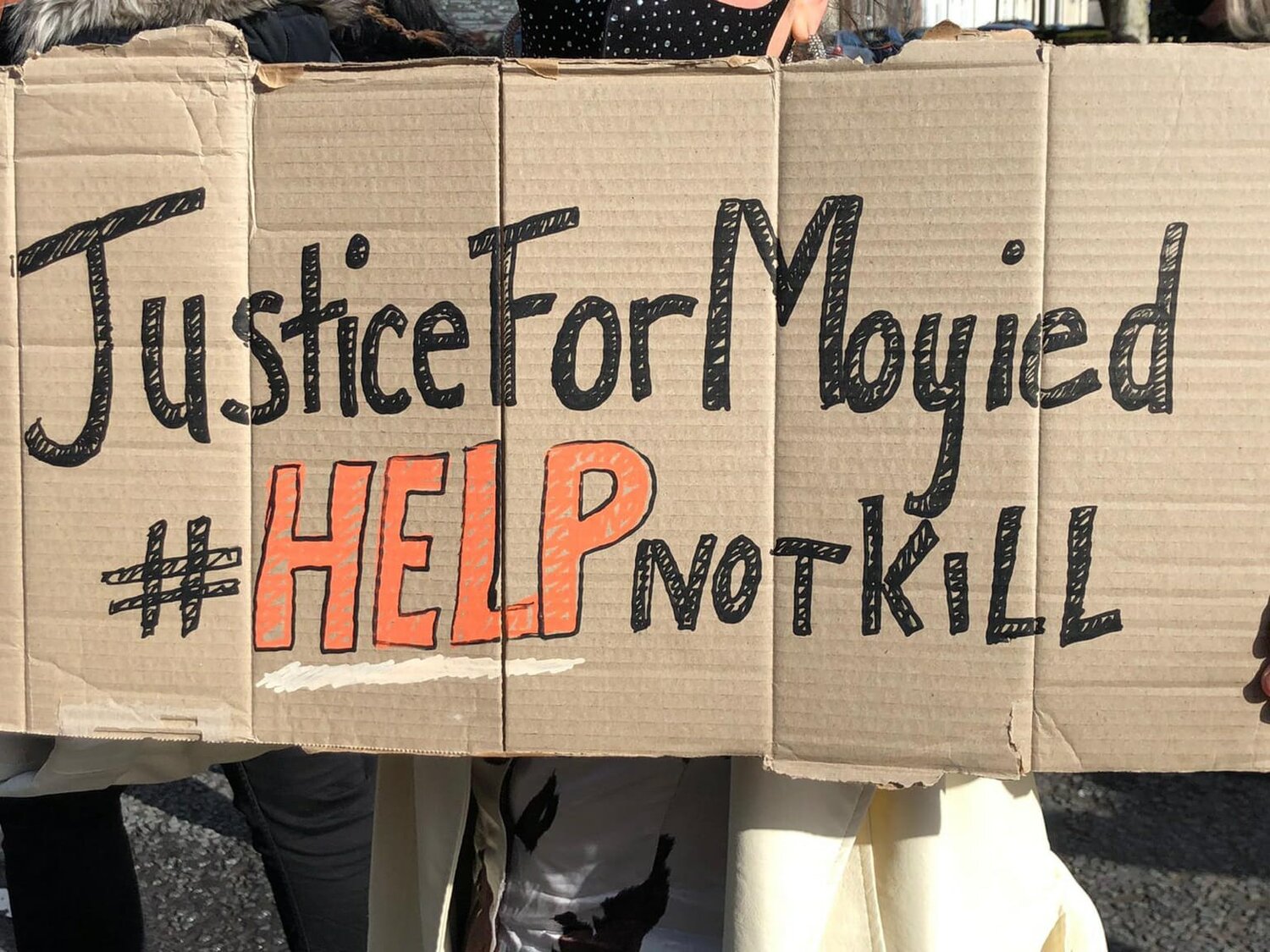
Workers Gear Up For Biggest Day of Strike Action Since 2011
Thousands of transport, school, university and civil service workers from five unions will be involved in the strike on February 1st.
By Adwitiya Pal. Cover image: University workers in the UCU strike in November 2022, Adwitiya Pal.
Half a million workers from multiple unions will strike across the UK this week in what is a major escalation in the labour revolt over pay and new anti-union legislation.
In Wales alone, almost 100,000 workers from different sectors are set to strike at more than 1000 picket lines on Wednesday, February 1st, representing a landmark moment.
Amidst the UK Conservative Government trying to pass an anti-strike Minimum Service Levels Bill, Wales Trade Union Congress (TUC) will bring workers and the public together in a series of lunchtime rallies across the country. A potent mix of soaring prices, a 13 year suppression of public sector wages, and the UK Government’s attempts to stifle the right to strike has helped prompt the mass walkout tomorrow.
Wales TUC’s General Secretary Shavanah Taj told voice.wales, “The Tory Government keeps saying that they want to resolve the disputes but their actions say otherwise. They have damaged the public sector enough, and now workers have no option but to strike.”
A number of trade unions have been balloting their members and have been on strikes since the first half of last year. But February 1st will mark the first time that so many unions have decided to join forces on a single day since 30 November 2011, when TUC led almost 2 million people to a day of industrial action against the Cameron Government’s changes to the pension scheme.
On several days last year, unions had taken action on the same day but none brought about this level of coordination. The call for more joined up action has been building for months, with a motion passed at the TUC conference in the Autumn stating the need for striking unions to work together and build support among non-unionised workers.
The unions involved tomorrow are the Rail, Maritime and Transport Workers (RMT) union, the Associated Society of Locomotive Engineers and Firemen (ASLEF), National Education Union (NEU), University and College Union (UCU), and the Public and Commercial Services (PCS) union.
The total number of striking workers in Wales, England and Scotland is expected to reach around 500,000 on a day the TUC has dubbed ‘Protect the Right to Strike’ day.
Each union engaged in the action tomorrow has its own mandate to strike, after beating minimum turnout requirements which were brought in in 2016 – the last round of anti-union legislation under the then Tory led government of David Cameron.
Now unions and their members face a far bigger threat.
The Minimum Service Levels Bill, if passed by the government, could see workers being forced to work even if they have won the ballot to strike, or face being sacked by their employers.
TUC General Secretary Paul Nowak said, “On February 1 we will hold events across the country against this spiteful new bill – which is unworkable and almost certainly illegal. We will call on the general public to show support for workers taking action to defend their pay and conditions, to defend our public services and to protect the fundamental right to strike.”
In Wales, rallies in support of the strikes and against the UK’s anti-strike bill will take place at at these locations:
Cardiff: UK Government Building, Ty Wiliam Morgan at 11:30 AM
Swansea: Castle Square at 12 noon
Aberystwyth: St Paul’s Hall at 12:30 PM
Wrecsham: Queen Square at 10:30 AM
Machynlleth: Town Clock at 10 AM
Besides the rally, all unions will have their individual picket lines spread across the country.
All nine universities in Wales — Cardiff University, University of South Wales, Cardiff Metropolitan University, Swansea University, University of Wales Trinity Saint David, Aberystwyth University, Wrexham Glyndwr University, Bangor University, and Open University, will have picket lines with lectures and professors.
The UCU has announced a further 17 strike dates till March. Yesterday, thousands of its members rejected the latest pay deal offered by UCEA. Students from across these universities have largely said that they are in support of the strikes.
Almost all schools in Wales are also expected to be affected by the strike, with many closed completely. In Cardiff and Swansea, two of Wales’ largest educational authorities, no school will be fully open tomorrow.
Mary Bousted, Joint NEU General Secretary, said, “The results show the Government that the NEU members will not stand by and see the education service they work so hard for and they care for so much be sacrificed. Teachers and support staff are being driven from the profession they love because of a toxic mix of low pay and excessive workload.”
Members of NEU have also rejected the recent 5% pay award, demanding a fully-funded above inflation pay deal. The union has announced seven more days of walkout in February and March, effectively shutting over 23,000 schools in Wales and England. Besides, NEU will stage two mass actions in Wales: at the Central Square, Cardiff and at the Supporting People Civic Centre, Pontypool tomorrow.
At Cardiff Central station, CrossCountry, Great Western and Network Rail workers from the RMT unions will be on strike, along with ASLEF union members who will strike at the Swansea station. Most other railway stations in Wales will see similar picket lines.
Civil servants working in the Driving and Vehicle Licensing Agency and driving examiners from the PCS union will be striking at various locations in Wales tomorrow including: Bridgend, Newport, Pontyclun, Pontypridd, Cardiff and Swansea.
In Cardiff, striking workers and their supporters are expected to march from their picket lines and gather en masse outside the UK Government building, near Central Square, from 11.30 in the morning.
Most of these unions are expected to continue the strikes later in February and March. They could be joined by the Fire Brigade Union, whose ballot results came out yesterday with 88% members voting to strike. Besides, NHS workers including nurses, ambulance workers, midwives and physiotherapists have also announced strike dates for the next two months.
The most recent of those dates will be 6 February, when nurses from Royal College of Nursing will be joined by ambulance workers, in what could be the ‘biggest ever strike day’ in NHS history. The RCN will continue to strike on 7 February, while paramedics from the Unite union will go on strike in Wales on 20 February, 6 March, and 20 March.
As all the unions gear up to pile pressure on the UK Government, Wales TUC is fixated on getting worker better pay deals and protecting their right to strike. Shavanah Taj said that she believes they will win the longer fight, irrespective of what happens in the coming few days. “This is about winning, we want to win these disputes, and we will find a way.”


